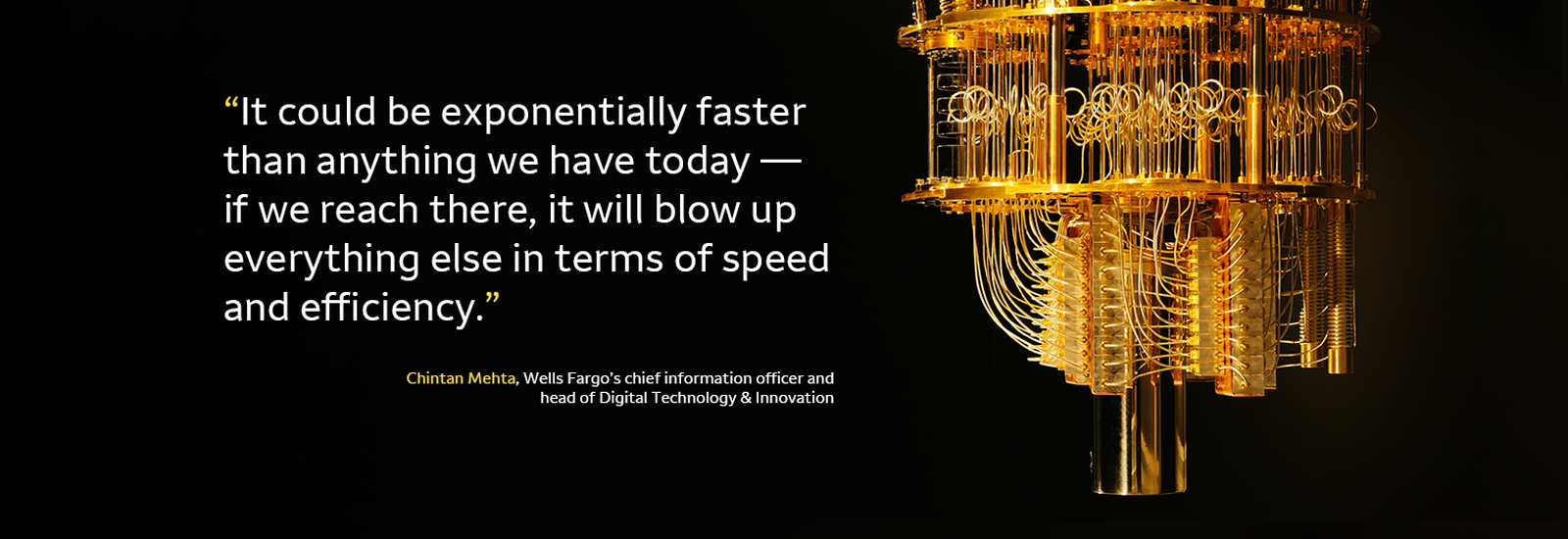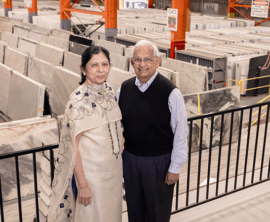Editor’s note
This is part 1 of the Wells Fargo Stories quantum computing series. Read part 2: “3 Ways Quantum Computing Could Help You.”
Key takeaways
- Quantum computers are fundamentally new kinds of devices with huge potential to speed up digital infrastructure as early as the next decade.
- Banks like Wells Fargo could one day put these computers to work by rapidly tracking scams to protect customers.
- Wells Fargo tech experts are already developing quantum algorithms through partnerships like IBM.
“It could be exponentially faster than anything we have today — if we reach there, it will blow up everything else in terms of speed and efficiency.”
That’s how Chintan Mehta describes quantum computing in the not-so-far-off future. As the latest technology making headlines, quantum computing has gone from sci-fi fantasy to cutting-edge invention in a matter of years, but its impact is still coming into focus. Mehta, Wells Fargo’s chief information officer and head of Digital Technology & Innovation, says quantum computing has the potential to revolutionize countless industries — banking included — and bring distant breakthroughs to the forefront.
“What quantum computing holds the potential to do is accelerate problem solving and discovery in areas which are very impactful to society, whether it’s artificial intelligence, manufacturing, or drug development,” Mehta said. “Quantum computing primarily aims to solve problems that today’s most-powerful classical supercomputers cannot practically solve and never will, which will be extremely profound across industries.”
1. What is quantum computing?
Simply put, quantum computing is a computer that relies on quantum mechanics to process information.
While the science around quantum physics is still being understood, the core difference is that quantum computers — which hold quantum processors in super-cooled chandelier-like systems — rely on qubits, while classical computing relies on a binary system of bits — 1s and 0s — to linearly make computations. This ability to move outside the binary system allows quantum algorithms to specialize in tackling more complex problems. Under their extreme conditions, quantum computers work in a multidimensional way to open up new and extremely large computational spaces, and discover solutions in data that a traditional super computer might take days or weeks to solve, if at all.
“In a quantum realm, because the physical capabilities have changed, it opens up an additional set of opportunities to speed up those mathematical operations,” Mehta said. “Quantum computing changes the whole range of the way you do [computing], the speed at which you do it.”

IBM scientists are developing larger and more powerful quantum computers, which allow for greater computing potential through more qubits and more supercooling hardware.
2. Why does quantum computing matter?
Quantum computing is important because of its potential to revolutionize the digital systems we use daily. But don’t expect quantum computers to show up in your personal devices.
“Nobody’s walking around with a quantum chip in their phone anytime soon, unless there’s a breakthrough in physics we haven’t found yet,” Mehta said. “For the most part, the way quantum is going to play out is that it’s going to become part of the core infrastructure for a lot of things.”
Mehta offers the example of creating a new pharmaceutical therapy. Hypothetically, it could take researchers years to sequence the correct molecules and produce the proteins necessary using classical computing systems. Quantum computers hold the potential to reduce that time significantly. Due to their specialty in finding patterns, these machines can run simulations, create models, and sift through many more possibilities much faster.
“You’re taking it from the point where human society can have a specific challenge and have a potential solution or solutions in a practical amount of time,” he said.
3. What impact will quantum computing have on banking?
Quantum computing holds the potential to revolutionize essential pieces of banking infrastructure that rely on building complex simulations and machine learning.
Financial institutions may soon be able to dramatically quicken their responses to cases of fraud. Other areas like authentication and authorization, anti-money laundering (AML), and know-your-customer (KYC) practices will be super-accelerated by quantum, Mehta said.
“Today, it takes some of the most sophisticated AI we deploy a few hours or days to catch a new pattern when it comes to, say, money movement scams. We need to see a certain number of instances and time to build those models,” he said. “[With quantum], the first time or two we see some new scam or money movement issue, we could have the capability to redeploy and retrain a model … to lock [it] down.”

Quantum computers don’t look like classical computers. Much of their hardware is dedicated to refrigeration, as quantum computing requires ultra-low temperatures near absolute zero — roughly minus 273 degrees Celsius.
4. What is Wells Fargo doing about quantum computing?
Though quantum is still in its infancy, Wells Fargo has been building partnerships and even creating quantum algorithms for years.
For example, the company joined the IBM Quantum Network in 2019 and has dedicated a team of quantum researchers and programmers through the partnership with IBM. Wells Fargo published six papers on quantum algorithms in 2022 — and more are coming.
“We’re building quantum-friendly algorithms and we test them on IBM’s infrastructure,” Mehta said. “[What we’re saying is], as the value and usefulness of quantum computers starts to emerge, these are the kind of algorithms we want to execute.”
Recently, Wells Fargo researchers have started exploring the larger systems IBM is developing, including the 433-qubit IBM Osprey processor, the most recent and largest to-date quantum processor IBM has deployed.
5. When will quantum computing be practical?
Large tech players and governments around the world are still working toward useful and practical quantum computers. Mehta estimates it could be a decade before these complex devices will deliver applications with a quantum advantage.
“There is still work to do,” Mehta said. “I am optimistic that we are beginning to enter an era in which we will soon begin to see momentum building around the value and usefulness emerging from quantum computing.”
But progress is coming. Dozens of companies are sprouting up every year to develop new quantum computing hardware, software, and more, according to The Quantum Insider. When IBM makes progress on its quantum computing systems such as the goals IBM continues to meet on its ambitious quantum development roadmap, companies in the IBM Quantum Network like Wells Fargo weigh use cases to put these breakthroughs into action.
“Everything goes through a cycle. Quantum will go through it multiple times based on how long its gestation period will be. There’ll be a breakthrough and they’ll say it’s back and then there’ll be a [quiet period] and they’ll say it’s gone,” he said. “We’ll cut through all of that.”






